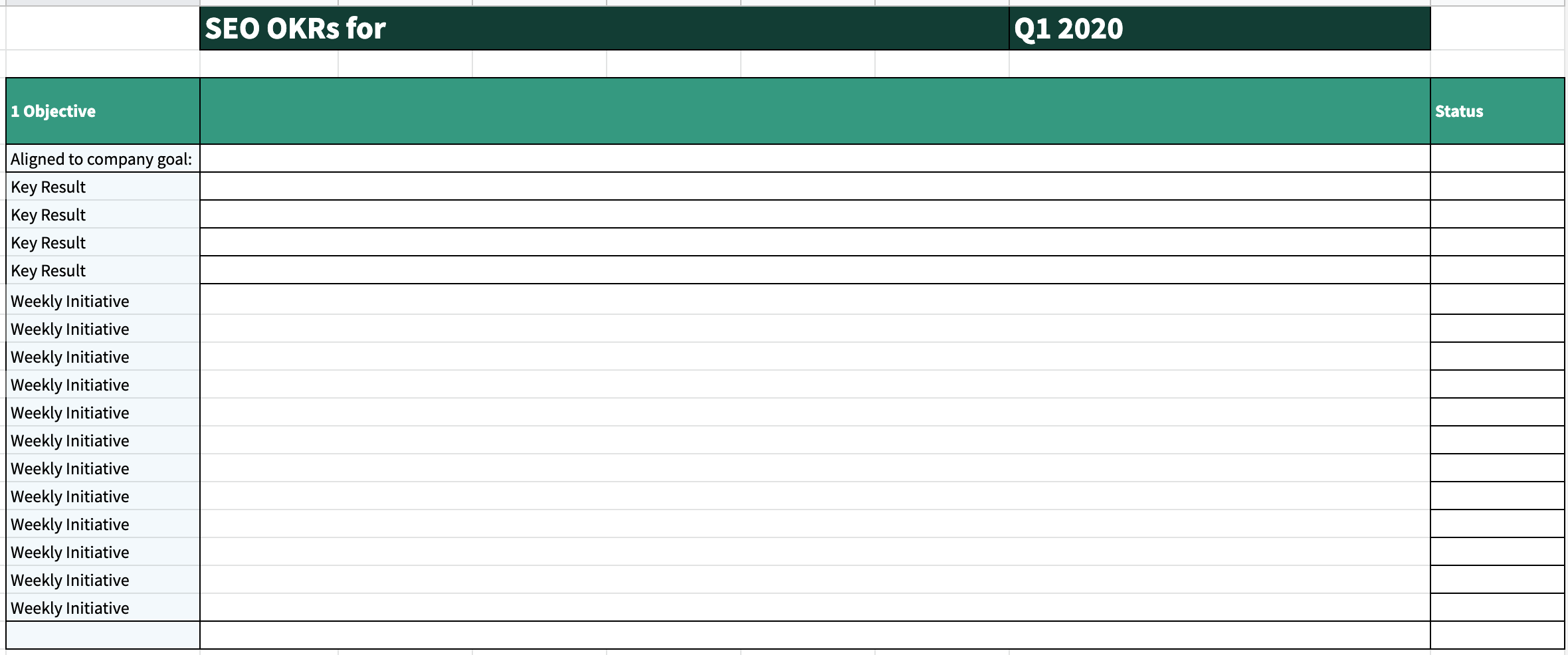This article is for marketing managers, CMOs, and other executives planning this year’s SEO strategy.
We will take the bird’s eye perspective on managing SEO to help you make smart decisions that will lead to more organic traffic and organic revenue in 2020.
This is equally true if you are leading an in-house SEO team or working with an external SEO agency.
We will cover:
- Setting SEO goals and objectives.
- Finding the gaps in your SEO.
- Meaningful SEO team meetings.
1. Prioritizing SEO Efforts with OKRs
We will want to define clear goals and objectives for our SEO campaign.
The reality of SEO is the reality of any successful endeavor: It will take strategic, consistent, and sufficient efforts to rank well.
This is why I like working with OKRs, which stands for Objectives and Key Result.
It is a management system used by many tech giants, including Google.
They make SEO efforts targeted for specific goals that we would like to achieve.
The objective is the purpose of our SEO activities. It is aligned with the company’s overall objective, vision, and purpose.
An objective can be more creative, inspiring, and interesting than a classic measurable (SMART) goal.
We usually set quarterly objectives with our clients. Creating objectives is a conscious process in which we engage in a discussion with the client, our team or other stakeholders to create the vision.
A few examples include:
- Drive the company’s data-driven content strategy.
- Run two backlink campaigns (English, German) to increase authority in Google.
- Guide strategy for German SEO to test non-English markets for lead generation.
- Build a strong foundation for SEO success by improving website structure.
They are aligned to bigger company goals such as:
- Increase exposure online and relevant organic traffic.
- Aggressive growth of overall revenue, especially with leads via organic traffic.
- Increased lead generation to 20 qualified leads per week.
Key results make the inspiring objective specific and measurable. An objective is achieved when all key results are achieved.
Key results could look like this:
- Grow organic traffic by X percent to Y users/month.
- Improve rankings for selected target keywords to X.
- Grow organic visibility for target keywords by X percent.
- Build X topically related backlinks via guest posts.
- Fix all the X technical issues outlined in the technical audit.
- Create X amount of SEO-driven content pieces per month.
- Improve unique, duplicate and common content metrics to X, Y, and Z.
- Improve page speed from X seconds to Y seconds on desktop and mobile.
You can find even more marketing OKR examples here.
OKRs paint a clear picture of where we would like to go.
They can be documented in a simple spreadsheet and help to streamline your SEO tasks.

Key results that cover more than just leads and revenue are especially important in SEO and content marketing since our efforts will have a lag time.
Your work today will make you successful in a few weeks or months from now when your keywords hit the top positions.
The top 3 rankings drive most of the organic traffic. Until you hit them, success might still seem out of reach.
And while organic traffic, conversion, and revenue ultimately are what we are looking for, we have to measure and understand progress to see if we are moving in the right direction and if our initiatives support our goals.
This is why you might want to supplement your key results with SEO health metrics such as growth in backlinks, referring domains, domain authority/ rating, page speed as outlined above.
I am a huge friend of reviewing effectiveness (even more so than efficiency).
The important question is:
Do our efforts have a significant impact? Are we generating output?
And in this case, output means improving the key results.
2. Finding the Gaps in Your SEO
If you are struggling to decide on your key results and where to focus on (content, links, technical), here are some ideas to consider.
If you want to rank successfully and increase organic traffic, your website needs to satisfy three main components. They are:
- Technical infrastructure: To allow Google to crawl and understand your website.
- Content relevance: To be found for your target keywords.
- Authority through backlinks: To drive rankings to the top positions.
The first step of a successful SEO strategy is understanding where your main bottlenecks and opportunities are.
- Is your website slow and needs to be optimized for web speed?
- Did you create relevant content that meets the user’s needs?
- Are niche-relevant websites linking to you?
The main thing to understand is:
There is no point in over-exploiting your preferred ranking factor.
Some SEO and marketing pros swear by links, some by content.
Don’t fool yourself by indulging in SEO philosophies or online discussions on who is right.
The reality of SEO is that you will need to be optimizing for all three SEO building blocks to be successful.
So, try to understand where the gaps are and start working on the ranking factors where you are deficient as well as improving those things that you are great at?
What have you focused on in 2019? And what factors might have been neglected? What factors contributed to the most success?
For those looking to understand ranking factors in detail, here are some great studies:
- 2019 study by Authority Hacker
- 2016 study by Brian Dean
As a rule of thumb:
- Many big, old websites with thousands of pages might want to focus on technical SEO, indexing, crawl budgets, and backlinks.
- Start-ups and small websites might want to focus on keyword-driven content creation, website structure, and backlink creation.
Understanding these building blocks is the necessary first step to build a cohesive SEO strategy and your key results should reflect all three components.
3. Meaningful SEO Team Meetings
Whether you manage an in-house team or an agency, here is a suggested meeting framework based on the principles of the book “Traction and the EOS” (entrepreneurial operating system).
This meeting framework helps to translate your OKRs into practical to-dos for every week.
Successful meeting 101: Same day, same time, same agenda, starts on time, ends on time.
The meeting agenda can look like this:
- Start on time – and with good news
- Reporting on company-wide OKRs
- Reporting on SEO OKRs, including:
- Last week’s initiatives and achievements
- Review of key results
- This week’s initiatives and to-dos
- Looking ahead at the next four weeks
- Discussion based on issues raised during reporting, including:
- Prioritizing of the issues
- Identify issue
- Discuss issue
- Solve issue (and create to-do or initiative)
- Conclusion, including:
- Recap of the initiatives or to-dos
- Rate meeting
Using OKRs and a clear meeting agenda helps to turn SEO into a practical and manageable activity that is focused on very clear targets. It makes SEO less blurry and confusing and dramatically increases your chance of being successful.
I recommend the following:
- Create an inspiring objective every quarter
- Make this objective measurable by defining key results
- Make sure to cover all three parts of SEO, not just your favorites
- Include health metrics that allow you to track progress
- Start a streamlined SEO meeting to track progress and raise and discuss issues
Happy ranking!
More Resources:
- SEO Is Everyone’s Responsibility: 5 Tips to Get Non-SEOs Bought Into SEO
- There Is No Single Way to Do SEO – Here’s Why
- A Technical SEO Checklist for the Non-Technical Marketer
Image Credits
Screenshot taken by author, January 2020




